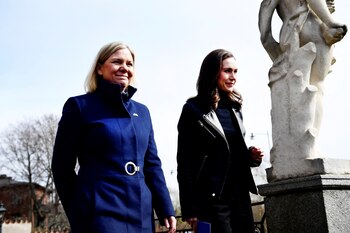
Sweden and Finland, allies but not members of NATO, today held a meeting at the highest level to discuss a hypothetical membership in the Alliance, which in the case of Helsinki could be a matter of weeks.
The two social-democratic heads of government from both countries, Sweden's Magdalena Andersson and Finland's Sanna Marin, agreed that the war between Russia and Ukraine changes European security policy and calls for a new analysis, including the relationship with NATO.
But while Marin was more explicit about the deadlines of a future decision and advocated the advantages of coincidental ones, Andersson was more cautious and refused to speculate.
“I think our process is going to be quite fast, we are talking about weeks, not months,” said Marin, who had already admitted days ago that the goal is to make a decision as consensual as possible before the NATO summit to be held in Madrid at the end of June.
Andersson, for his part, avoided talking about specific deadlines and did not confirm the news reports that appeared today in Sweden about an Atlantist turn of his party.

“We must analyze the situation to see what is best for the security of Sweden and the Swedish people, and we must not rush. It must be done very seriously and thoroughly,” said Andersson, who nevertheless clarified that there is no point in delaying the process and recalled that there are general elections in his country in September.
FINNISH REPORT FORECASTS TENSIONS WITH RUSSIA
Both countries have launched a parliamentary discussion on security policy, albeit at a different pace.
The Eduskunta (Finnish Parliament) today presented a report on the subject, which foresees tensions on its border with Russia as a result of a future accession to NATO, while considering that maintaining the “status quo” in the context of the war conflict in Ukraine also carries risks.
This document, which contains no proposals, will serve as the basis for the debate on possible entry, which will take place in one week.
A parliamentary committee will choose the option that it deems most suitable for Finnish security and will present a proposal to the Eduskunta, where it will be debated and voted on, and then the Executive will propose the future security and defence policy, which could be based on asking for entry into NATO, the most likely option.

The parallel Swedish report should be ready by 31 May, although Andersson stressed that this is a deadline and could be submitted earlier.
“Finland's decision will be part of that analysis, but each country will make its own independently,” Andersson said today when asked whether a Finnish entry would not force Sweden to do the same.
Marin also noted that these are sovereign decisions, although it influenced the “close dialogue” between the two countries during the process and advocated a coincident stance.
“I would prefer that we take the same position throughout the region, but it is a Swedish decision,” he said.
TURN IN THE SWEDISH DEBATE
Although a Finnish decision in favour of joining NATO seems closer, in Sweden the situation has changed in recent days.

The Swedish Social Democratic Party, which heads a minority government, announced on Monday the opening of an internal debate on the security situation in Europe and its stance towards NATO, which has hitherto been opposed to an entry.
The reason given was the change in security brought about by the war in Ukraine, despite the fact that the party approved in November at its last congress to maintain the current status.
And the far-right Democrats of Sweden (SD), the third parliamentary force and so far sceptical of joining the Alliance, also decided on Monday that Sweden should enter if Finland does the same earlier.
(with information from EFE)
KEEP READING:
Últimas Noticias
Debanhi Escobar: they secured the motel where she was found lifeless in a cistern
Members of the Specialized Prosecutor's Office in Nuevo León secured the Nueva Castilla Motel as part of the investigations into the case

The oldest person in the world died at the age of 119
Kane Tanaka lived in Japan. She was born six months earlier than George Orwell, the same year that the Wright brothers first flew, and Marie Curie became the first woman to win a Nobel Prize

Macabre find in CDMX: they left a body bagged and tied in a taxi
The body was left in the back seats of the car. It was covered with black bags and tied with industrial tape
The eagles of America will face Manchester City in a duel of legends. Here are the details
The top Mexican football champion will play a match with Pep Guardiola's squad in the Lone Star Cup

Why is it good to bring dogs out to know the world when they are puppies
A so-called protection against the spread of diseases threatens the integral development of dogs




